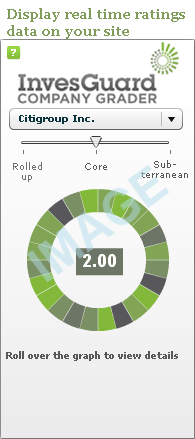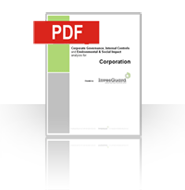March 25th, 2010
From the time we started presenting InvesGuard’s scores on the non financial metrics of public companies, Citigroup has been our ‘poster boy’ for poor corporate governance. Click Sample (Citigroup) to see its scores as they stood in April 2009. Overstretched directors (2 directors were held 4 public company directorships. 3 out of 14 directors were CEO’s of other public companies.) and ill suited directors were the top concerns at Citigroup then.
In addition, InvesGuard also scrutinizes experience and backgrounds of directors especially in the case of financial and banking companies in order to ensure suitability for the Audit, Risk, Credit and other ‘finance centric’ Board Committees. In this area too, Citigroup as it stood in April 2009 left something to be desired. 2 out of 5 directors on the Board’s Audit and Risk Management appeared to lack experience that could be considered essential to providing audit, financial and risk management oversight specific to a company in the financial industry.
As a result of recent changes in the composition of the Board’s Audit committee, all directors on this committee now have relevant and adequate financial industry experience. In addition, Citi has now created a separate Board level Risk Management committee. The primary aim of this committee is to provide ‘oversight of Citigroup’s risk management framework’. Of course, only time will tell whether the members of this Board committee have been performing their job adequately.
CEO Vikram Pandit’s testimony before the Congressional Oversight Panel on March 4, 2010 attributed ‘questions about the Bank’s financial condition’ to the ‘quality of some of our assets’. Previously, oversight of asset quality was not within the purview of any Board Committee. With changes to Citigroup’s overall Board composition and structure, the newly formed Citi Holdings Oversight Committee is tasked with the responsibility to oversee the management of ‘the special Asset Pool (including assets covered by the loss-sharing agreement with the U.S. Government). Another new Board Committee which is the Risk Management and Finance Board Committee is now responsible for ‘oversight of Citgroup’s risk management framework, including the significant policies, procedures and practices used in managing credit, market and other risks…..” Although both these committees do not directly cover areas such as oversight of the adequacy of allowances for loan and lease losses and related written policies and procedures, yet the enhanced oversight measures provide some degree of comfort. Again, with the changes in Board composition, both these committees are staffed with directors with previous banking and financial industry experience. Last week, we blogged about Lehman’s poor choice of directors. Directors with zero financial management or banking background were in charge of providing risk management oversight.
By installing directors with more relevant experience, Citigroup has taken a step in the right direction. Let’s hope these steps keep it on the right path.
please wait...
Rating: 0.0/5 (0 votes cast)
Tags: citigroup director shakeup a success?
Posted in Citigroup, Corporate Governance, company | No Comments »
March 1st, 2010
A vigilant reader pointed out that this post had some repeats in a couple of paragraphs…..Wordpress went a little crazy when I tried to insert that table at the end.
My apologies to everyone. The post is now clean.
Sometime back,we covered a post investigating whether financial institutions are rushing to re instate compensation and pay policies now that they were out of the emergency funding program- TARP. There were several companies that we named here that changed their compensation structure including increasing cash salaries for senior executives.
One more that we are adding to that list is Wells Fargo. The changes instituted at Wells affect cash salaries of top executives . These changes have caused their cash salaries to jump so steeply that it could potentially eclipse any compensation issues that ‘all-time-poster-boy-for-excessive- compensation’- Goldman Sachs may appear to have.
On February 26th, the Board Compensation Committee (or Human Resources Committee as it is called over at Wells), made some changes to the compensation structure of its top executives. These executives are now to be paid their full salaries in cash versus being paid partly in the form of company stock which was the erstwhile compensation structure under Wells Fargo’s Long Term Incentive Compensation Plan.
Back in August 2009, salaries of these executives were increased to reflect an increased percentage of remuneration in company stock , but the cash portion of their salaries remained unchanged.
Wells Fargo repaid the entire amount it had borrowed under the Government’s TARP program in December 2009. Following this repayment, the Board Compensation committee of Wells Fargo increased the base salaries of the same senior executives yet again but this time the increased salaries will be paid entirely in cash with no stock component. These changes will be effective March 2010.
From the table below, it is painfully obvious that cash salaries for these executives have significantly jumped. John Stumpf, Chairman and CEO has seen his cash salary jump from $900,000 to $2,800,000 as was the case for Mark Oman(Senior Executive Vice President and head of Home and Consumer Finance), who had announced his retirement from Wells Fargo at the end of 2009. Not only does he continue with the company, but he also received a bump of $1,400,000 in his cash salary which takes his total cash salary to $2,000,000. As everyone knows, increments for middle to lower rung managers and staff are frozen at most companies with maximum salary increases of 2% to 3%. How does one justify this kind of salary hike of more than a 100%?
On the other hand, Wells shares have languished around $25- $27 a share. Wells Fargo closed at $27.34 a share on 2/26/2010. It looks like popular backlash against excessive compensation as well as the threat of regulation have not deterred Wells’ Board from rewarding executives for what appears to be an execution of their usual and not any kind of ‘above and beyond’ type of job responsibilities. With all the public attention on Goldman officers and their compensation, salary changes at other financial institutions seem to be going unnoticed under the radar.

please wait...
Rating: 0.0/5 (0 votes cast)
Tags: bankers pay, under the radar pay jumps
Posted in Corporate Governance, Wells Fargo, company | No Comments »






